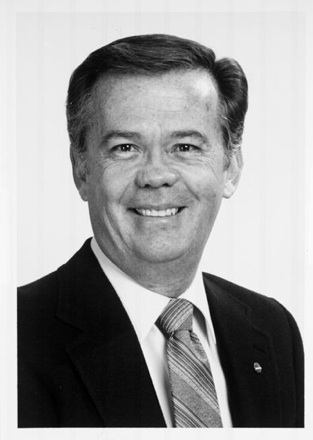Biography: Robert Fridley
Robert Fridley, a professor emeritus of biological and agricultural engineering, was known as an expert on fish farming and mechanized fruit harvesting. His most significant developments included the inertial tree shaker, the integrated shake-catch harvester, shaker clamps that minimized damage to tree bark, and criteria for the design of fruit-catching surfaces to minimize the bruising of fruit during harvesting and handling. He held several patents on these methods.
 His fascination with harvesting methods undoubtedly resulting from having grown up in a family involved with part-time farming and ranching. He supported his college education by working with livestock and in a fruit-packing shed and lumber mill.
His fascination with harvesting methods undoubtedly resulting from having grown up in a family involved with part-time farming and ranching. He supported his college education by working with livestock and in a fruit-packing shed and lumber mill.
After obtaining an undergraduate degree at UC Berkeley and a master’s degree at UC Davis — both in agricultural engineering — he joined the UC Davis faculty in 1961. He became a visiting professor at Michigan State University in 1970, earned a doctorate there in ’73, and then returned to UC Davis to chair the Department of Agricultural Engineering from 1974 to ’76.
His parallel interest in aquaculture resulted from an eight-year stint with the Weyerhaeuser Company, in Tacoma, Wash. Fridley initially focused on forestry upon his arrival in 1977, but then became involved with the company’s experiments in raising salmon by using the hot water from its plants.
Fridley subsequently returned to UC Davis in 1985, to direct the campus’ Aquaculture and Fisheries Program, which he expanded and strengthened. That same year, he was elected to the National Academy of Engineering, recognized for his managerial ability and research toward the mechanization of tree harvesting. He subsequently chaired the Project 2000 Strategic Planning Steering Committee for the College of Agriculture and Environmental Sciences, and was appointed executive assistant dean in 1989.
Fridley was equally accomplished at less rarefied projects. He and his wife of 50 years, Jean, built their first home themselves; they subsequently raised three sons — James, Michael and Kenneth — who following in their father’s engineering footsteps.
Fridley officially retired in 1994, although he continued to serve as a special assistant to the dean through 2000. He died on March 19, 2006. Colleagues remember him as an inquisitive researcher who thrived on seemingly irresolvable problems and near-impossible-to-achieve objectives.
